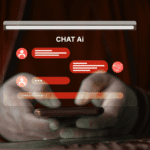In today’s fast-paced and ever-changing business environment, future-proofing your operations is essential. AI offers transformative potential to help businesses of all sizes stay ahead of the curve, adapt to disruptions, and secure long-term sustainability and growth. This article provides actionable strategies and insights on leveraging AI for future-proofing your business.
1. Embracing Agile AI Strategies and Business Models
Adaptive AI Systems and Rapid Prototyping:
Building AI systems that adapt to changing conditions is crucial (Source: Gartner -Why Adaptive AI Should Matter to Your Business). Use real-time data processing and continuous model training to ensure resilience. Implement AI for rapid prototyping to test and iterate new products quickly. Practical steps include:
- Real-Time Data Processing: Use AI to process and analyse data continuously.
- Continuous Model Training: Regularly update AI models with new data.
- AI-Driven Design Tools: Leverage AI for rapid product development.
Subscription and As-a-Service Models:
AI can facilitate the transition to subscription-based and AI-as-a-Service business models. These models create recurring revenue streams and offer continuous value. Practical steps include:
- Develop AI-Powered Platforms: Create platforms offering AI services on a subscription basis.
- Personalised Customer Experiences: Use AI for tailored services.
- Automated Management: Implement AI for subscription and billing processes.
2. Enhancing Predictive Capabilities and Innovation
Advanced Predictive Analytics and Digital Twins:
Next-generation predictive analytics powered by AI enhances strategic decision-making (Source: What Is AI-Powered Predictive Analytics and How Does It Work, StackAI) Digital twins help simulate and optimise operations. Practical steps include:
- Data Integration: Consolidate data for comprehensive predictive analysis.
- AI-Driven Forecasting Tools: Use AI to predict trends and behaviours.
- Creating Digital Twins: Develop virtual replicas of critical assets.
AI-Driven Innovation Programmes and Cross-Functional Teams:
Fostering a culture of innovation involves AI-focused programs and cross-functional teams. Practical steps include:
- Innovation Hubs: Establish spaces for AI projects.
- Incentivising Innovation: Encourage employee participation.
- Collaborative Tools: Use tools to facilitate team communication.
3. Leveraging AI for Sustainability and Ethical Challenges
AI for Environmental Impact and Sustainable Supply Chains:
AI can help businesses reduce their environmental footprint and enhance supply chain sustainability. Practical steps include:
- Energy Optimisation: Use AI to monitor and optimise energy use.
- Sustainable Resource Management: Improve waste management with AI.
- Predictive Supply Chain Management: Forecast demand to reduce waste.
Ethical AI Frameworks and Compliance:
Developing ethical frameworks and managing compliance are critical. Practical steps include:
- Establish Ethics Committees: Oversee AI projects.
- Bias Detection Tools: Use AI to detect and mitigate biases.
- Automated Compliance Monitoring: Ensure adherence to regulations.
4. Building Resilient AI Systems
Scalable AI Architectures and Business Continuity:
Building scalable AI systems that grow with the business is critical. AI plays a vital role in disaster recovery and ensuring continuity. Practical steps include:
- Cloud-Based Solutions: Use scalable AI platforms.
- Modular Design: Develop AI systems with modular architecture.
- AI-Driven Monitoring: Implement continuous system monitoring.
5. Continuous Learning and Improvement
AI-Driven Learning Systems and Feedback Loops:
AI systems that continuously learn and improve are essential for long-term success. Practical steps include:
- Incremental Learning Models: Implement models that learn from new data.
- Performance Monitoring: Continuously monitor AI performance.
- Regular Updates and Iterative Testing: Update AI models based on your own real performance data.
Future-proofing your business with AI requires a strategic approach that embraces adaptability, innovation, and sustainability. By leveraging AI, businesses can enhance their resilience, drive growth, and secure long-term success.
Common FAQs
Future-proofing with AI means using artificial intelligence to help your business adapt to change, improve resilience, and stay competitive. This includes streamlining operations, improving decision-making, and identifying new revenue opportunities.
Digital twins are virtual replicas of real-world systems or processes. They use real-time data to simulate and optimise operations, helping businesses make smarter decisions, reduce risks, and test changes before applying them in the real world.
Start by identifying business goals that AI can support. Focus on building a strong data infrastructure, exploring quick-win use cases, and ensuring teams are ready through training and cross-functional collaboration. To see how we do this with our clients, explore our AIPD Framework: our structured approach to identifying, planning, and delivering AI solutions.
Ready to See Where AI Can Take You?
Whether you’re just getting started or refining your AI strategy, we’ll help you figure out the next best move.







